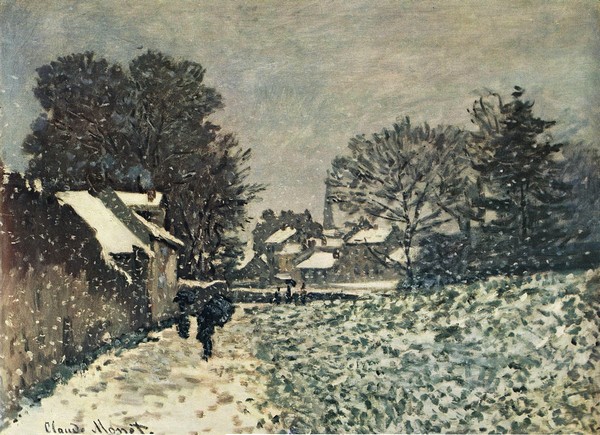
We are in the middle of June and what we could call our "regular season" is about to finish; except for unforeseen events, July will belong to the students of the Master's Degree of Lied-ESMUC and, in August, I’ll focus on the Schubertíada, as I did in previous years. Once more, I have a few pending posts; Some of them will be moved to my next season's notebook (mental note: to buy the next season's notebook) and others will patiently wait to draw my attention again. But still two weeks to go, so let's get started with the first one. When I learned that Joyce DiDonato would sing Winterreise this summer in Vilabertran, I realized that it would be the first time I would listen to that cycle sung by a woman in a recital; so, I wrote down: ladies that sing songs for gentlemen.
Many years ago, I talked about gentlemen who sing songs for ladies. At that time, the excuse was Jonas Kaufmann's recording of Wagner's Wesendonck Lieder; the tenor, and director Donald Runnicles argued that there is nothing in Mathilde Wesendonck's poems that labels them as female or male poems. Therefore, there shouldn’t be a problem if f a man sang these songs, despite Wagner had specified at the score that they were für Frauenstimme (for a woman's voice). I agree with them. Of course, a tessitura change would affect the appreciation, but this reflection, as we discussed previously, could also apply to a song sung by a tenor or a baritone. Meaning that it doesn't necessarily have to be related to a change of sex.
But what if the poetic voice clearly matches with a woman, as is the case of Frauenliebe und -leben or to a man, as Winterreise, our pretext today? The debate about the convenience of either a man or a woman to sing them is not new; when Elisabeth Schwarzkopf said that she wanted to sing Winterreise the answer was: "Elisabeth, my dearest, you're not a man!" It's not a new debate, but it's not that old either. Do you know who sang Frauenliebe und -leben for the first time? A gentleman. And Dichterliebe? A lady.
That is, there was a time when men and women were able to sing those songs they liked the most without genre considerations. I would say that it lasted until the 1930s; the mezzo-soprano Elena Gerhardt, for example, often sung Winterreise during the interwar period. However, a time came (together with those first Lied recordings, during the World War II) when it was agreed that male cycles were sung by men and female cycles, by women, as done in Opera (should I mention trouser roles or the witch in Hänsel und Gretel?).
And the discussion arises: do Lied singers really play a role? If yes, if we think that singing Lied is like playing a theatre role, it would be difficult to accept a man who talks, moved, about his pregnancy in Frauenliebe und -leben. On the other hand, if we think that we're listening to a poetic voice, voice and piano blended, that would be a minor detail. Or maybe we're halfway and give singers the opportunity to make us forget about their sex. This was the argument of Lotte Lehmann, the first woman to record a complete Winterreise (in fact, there were two incomplete recordings, in 1940 and 1941, later joined):
“Why should a singer be denied a vast number of wonderful songs, if she has the power to create an illusion which will make her audience believe in it? It would be a very sad indication of incapacity if one could not awaken in the listener sufficient imagination to carry him with one into the realms of creative phantasy.”
Despite Lehmann's reflections, women kept away from Winterreise for decades, until the late 1980s, when two wonderful ladies, Christa Ludwig and Brigitte Fassbaender, recorded the cycle. Since then, a lady who sings Winterreise is no longer such a strange option (at least, this is fairly more common than a gentleman who sings Frauenliebe und -leben). But I'm afraid that's an unusual case; Let's consider, for instance, other male cycles such as Die schöne Müllerin, Dichterliebe, or so many other...
My first Winterreise recording with a female voice was that of Christa Ludwig and James Levine; I'm sharing the second song, Die Wetterfahne (The weathervane). What do you think? Is it suitable a woman singing a man’s words?
Before the audition, however, I would like to introduce a recently published website exclusively devoted to this cycle, https://winterreise.online His creator, Iain C. Phillips, has collected a lot of related information: recordings (they're ordered by voices, so you could have a look at the Winterreise sung by women), translations to many languages, a concert schedule, books, artistic works... I bet you’ll stay quite a long time on this website if you haven’t done it already. And, if you feel there is something missing, get in touch with Iain; He will be delighted to add concerts, books, recordings, etc. in order to offer a more complete information each time.
Der Wind spielt mit der Wetterfahne
Auf meines schönen Liebchens Haus.
Da dacht’ ich schon in meinem Wahne,
Sie pfiff’ den armen Flüchtling aus.
Er hätt’ es eher bemerken sollen,
Des Hauses aufgestecktes Schild,
So hätt’ er nimmer suchen wollen
Im Haus ein treues Frauenbild.
Der Wind spielt drinnen mit den Herzen,
Wie auf dem Dach, nur nicht so laut.
Was fragen sie nach meinen Schmerzen?
Ihr Kind ist eine reiche Braut.












